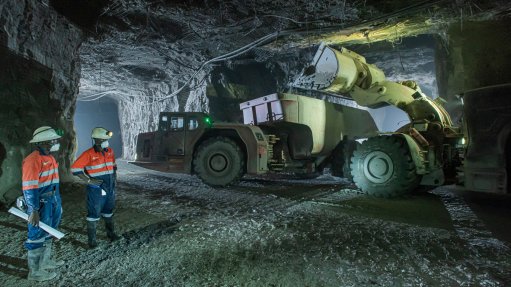
The Loulo-Gounkoto mine is on track to meet its production guidance of 510 000 oz to 560 000 oz for 2022, despite the sanctions imposed on Mali by the Economic Community of West African States (Ecowas).
A robust supply chain and strong partnerships helped Loulo-Gounkoto to withstand the sanctions, said Toronto- and New York-listed Barrick Gold at the weekend.
The Ecowas sanctions, imposed in January, were lifted at the weekend after Mali’s military government proposed a 24-month transition to democracy.
While Barrick Loulo-Gounkoto managed to ride out the impact of the sanctions, Australian company Firefinch on Monday withdrew its guidance for the Morila mine – a former Barrick asset – citing the impact of Ecowas sanctions as a contributing factor to the mine’s underperformance.
Speaking at the Loulo-Gounkoto complex at the weekend, Barrick CEO Mark Bristow said that the mining group remained committed to Mali.
“First as Randgold and now as Barrick, we’ve been operating in Mali for 25 years and we plan to be here for at least as long again,” he said.
Bristow cited the commissioning of the Gounkoto underground mine and the Gara West openpit, the continuing replacement of reserves, the extension of the solar power plant and the strengthening of local partnerships as instances of the company’s long-term commitment to the country.
“In the first half of the year we’ve contributed $337-million to the Malian economy in the form of taxes, royalties, dividends, salaries and payments to local suppliers, taking the lifetime contribution of Barrick, previously Randgold, to $8.5-billion.
“We’re particularly proud of the fact the Gara West pit is being mined for us by two Malian contractors we have mentored,” said Bristow.
Barrick continues to invest in sustainable economic community projects, establishing a motel, a farm for Kenieba women and three water supply systems during the quarter. The Loulo agricultural college, designed as the foundation of a sustainable regional agribusiness, has already trained 21 women and 143 men and created 30 farms.
Since the opening of the mine, Loulo-Gounkoto has built 20 schools in its neighbouring villages, taking student enrolment from 500 to more than 5 000. Seventy-eight of them are currently benefitting from the complex’s bursary programme and Loulo-Gounkoto is also supporting teachers’ salaries.